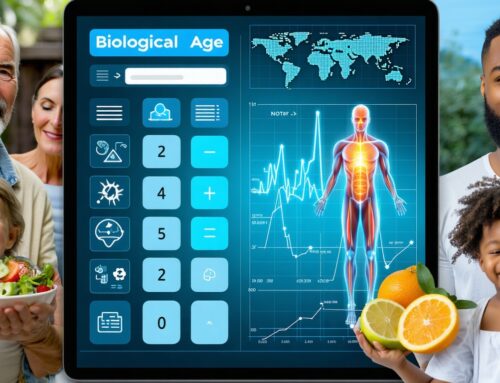Understanding Biological Age
Biological vs. Chronological Age
Alright, let’s break it down. When you’re talking about biological age and longevity, it’s like comparing apples to oranges with chronological age. Chronological age is just the number of candles on your birthday cake. Different cultures have their own quirky ways of counting age. Some even start the clock at one year old when you’re born and add another year at the Traditional Chinese New Year instead of your actual birthday.
Biological age, though, is a whole different ball game. It’s about how your body is holding up and functioning. This is where things like your genes, lifestyle choices, and the environment come into play. Doctors use stuff like blood pressure checks, fancy imaging, and lab tests to figure out your biological age (Mayo Clinic).
| Age Type | Definition | Influencing Factors |
|---|---|---|
| Chronological Age | Number of years alive | Birthdate, cultural quirks |
| Biological Age | How your body’s doing | Genetics, lifestyle, environment |
Getting the hang of these two types of age is key to figuring out your health and how long you might stick around. While chronological age is just a number, biological age gives you a sneak peek into how well your body is actually doing.
Epigenetic Clocks and Aging
Now, let’s talk about epigenetic clocks. These are like the new kids on the block for measuring biological age. They look at DNA methylation patterns in your blood to give you an idea of your biological age. The latest buzz in epigenetics is that our epigenome might hold the secret sauce for understanding and calculating human biological aging (Harvard Bioethics Journal).
Epigenetic clocks are currently the top dogs for estimating biological age. Research shows that biological age can predict things like how long you might live, your risk of getting sick, and even if you might feel down in the dumps, better than chronological age can (Nature Medicine).
| Epigenetic Clock | Measurement | Accuracy |
|---|---|---|
| DNA Methylation | Blood samples | High |
| AI-enabled EKGs | Heart function | Moderate |
| Senescent Cells | Cellular aging | Moderate |
With tech getting all fancy, like AI-enabled EKGs, we can now spot the difference between chronological and biological age. Turns out, if there’s a big gap between the two, it might mean trouble for your heart. Plus, checking out those senescent cells can also clue us in on biological age.
By getting a handle on these tools, you can get a better grip on your biological age and start making moves to boost your health and stick around longer. For more on figuring out your biological age, check out our guide on how to calculate biological age.
Biomarkers for Biological Age
Getting a grip on the markers that show your biological age can give you a peek into your health and how long you might stick around. Two big players in this game are DNA methylation and blood markers.
DNA Methylation and Aging
DNA methylation is like adding a little tag to your DNA that tweaks how your genes act without messing with the DNA itself. It’s a big deal for keeping your body’s functions in check and is a solid clue about your biological age. The latest buzz in epigenetics hints that our epigenome might hold the secret to figuring out human biological aging (Harvard Bioethics Journal).
Epigenetic clocks, which measure DNA methylation in blood, are currently the most accurate and promising estimates of determining biological age. Studies have shown that biological age can predict mortality, risk of disease, and depressive symptoms more accurately than chronological age. For example, if a woman’s biological age is 5 years ahead of her actual age, her breast cancer risk jumps by 15% (Journal of the National Cancer Institute).
| Biological Age Difference | Increased Risk of Breast Cancer |
|---|---|
| 5 years | 15% |
Epigenetic clocks also predict all-cause mortality in later life better than chronological age, indicating a strong relationship between epigenetic clocks and the biological aging process. Police agencies and labs are keen on using these clocks to whip up forensic tests that can pin down the age of folks at crime scenes using body fluids or blood (Vox).
Blood Biomarkers and Aging
Blood markers are another handy tool for checking out your biological age. These include proteins, fats, and other bits floating around in your blood that can spill the beans on your health and aging. Blood markers can flag inflammation, oxidative stress, and other aging culprits.
Some common blood markers used to assess biological age include:
- C-reactive protein (CRP): A sign of inflammation in your body.
- Interleukin-6 (IL-6): A player in inflammation and immune response.
- Tumor necrosis factor-alpha (TNF-α): A big name in systemic inflammation.
- Glucose and insulin levels: Clues about your metabolic health.
- Lipid profiles: Covering cholesterol and triglycerides, linked to heart health.
| Biomarker | Indicator |
|---|---|
| C-reactive protein (CRP) | Inflammation |
| Interleukin-6 (IL-6) | Inflammation and immune response |
| Tumor necrosis factor-alpha (TNF-α) | Systemic inflammation |
| Glucose and insulin levels | Metabolic health |
| Lipid profiles | Cardiovascular health |
Keeping an eye on these markers can help you get a handle on your biological age and make moves to boost your health and stick around longer. For more on how to figure out your biological age, check out our article on how to calculate biological age.
By getting the scoop on DNA methylation and blood markers in sizing up biological age, you can snag some insights into your health and take steps to up your longevity game. Dive into our resources on biological age assessment tools and biological age testing methods to learn more about the tools available for keeping tabs on your biological age.
Factors Influencing Biological Age
Genetic Influence on Aging
Your genes are like the blueprint for how you age, but they only tell part of the story. They account for just 15% to 25% of the aging process. So, while your DNA does have a say in how you age, it’s your day-to-day choices that really steer the ship.
Some genes, like APOE, FOXO3, and CETP, are linked to living longer. These genes help with things like fixing DNA, keeping cells healthy, and managing blood fats and inflammation. They also support your heart and immune system, which can fend off age-related issues like heart disease and stroke.
But here’s the kicker—not everyone who lives to a ripe old age has these genetic perks. Studies on folks who live past 100 have found various gene variants that might help, but it’s really the lifestyle choices that make the biggest difference, especially in the first 70 or 80 years.
Lifestyle Factors and Aging
What you do every day has a huge impact on how you age. Making smart lifestyle choices can really slow down the clock. Here’s what you should focus on:
- Not smoking
- Drinking alcohol in moderation
- Eating lots of fruits and veggies
- Staying active
- Getting good sleep
- Keeping a healthy weight and waist size
Sticking to these habits is linked to slower aging, as shown by various health measures.
| Lifestyle Factor | Impact on Biological Age |
|---|---|
| Not Smoking | Cuts down on chronic disease risk |
| Moderate Alcohol | Lowers chances of liver and heart issues |
| Fruits and Veggies | Packs in nutrients and antioxidants |
| Staying Active | Boosts heart health |
| Good Sleep | Aids in cell repair and renewal |
| Healthy Weight | Lowers risk of metabolic problems |
By weaving these habits into your life, you can give your biological age a boost and live longer. Check out our articles on biological age and diet, biological age and exercise, and biological age and sleep for more tips.
Knowing how your genes and lifestyle work together can help you make smart choices for your health. Use a biological age calculator to track your progress and find ways to live a longer, healthier life.
Tools for Assessing Biological Age
Figuring out your biological age can give you some real insight into your health and how long you might stick around. There are some pretty nifty tools out there to help you with this, like epigenetic clocks and metabolite analyses.
Epigenetic Clocks in Forensics
Epigenetic clocks are like the Sherlock Holmes of the DNA world. They estimate your biological age by checking out DNA methylation patterns. These clocks have caught the eye of forensic folks. Cops and labs are keen on using these clocks to figure out the age of people involved in crimes, just by looking at body fluids or blood.
These clocks can guess a person’s age with a wiggle room of two or three years, which is pretty handy for solving crimes. Researchers have whipped up a model using blood samples with over 450,000 possible markers to pin down a person’s age. It takes about two hours and costs around $10.
| Tool | Accuracy | Time Required | Cost |
|---|---|---|---|
| Epigenetic Clock | ±2-3 years | 2 hours | $10 |
These clocks are better at predicting when you might kick the bucket than just looking at your birth certificate, showing a strong link between these clocks and how your body ages. For more on how these clocks tick, check out our page on biological age assessment tools.
Metabolite Analyses for Aging
Metabolite analyses are another cool way to check your biological age. This involves looking at the tiny molecules in your body that are part of various metabolic processes. By studying these metabolites, researchers can see how aging messes with your body and maybe even predict how long you’ll live.
Metabolite analyses give a full picture of your biological age by checking out different biomarkers in your blood. This method is still getting polished, but it’s got a lot of potential for future aging research. Researchers are using tools like metabolite analyses and epigenetic methylation clocks to get a better grip on how aging affects us (Vox).
| Tool | Biomarkers Analyzed | Potential Insights |
|---|---|---|
| Metabolite Analysis | Various metabolites | Aging effects, lifespan prediction |
To get the lowdown on how these analyses work and what they can do for you, check out our article on biological age testing methods.
By using these cutting-edge tools, you can get a better handle on your biological age and take steps to boost your health and stick around longer. For more on figuring out your biological age, visit our page on how to calculate biological age.
Impact of Psychological Factors
Psychological States and Aging
How you feel inside can really mess with how old your body thinks it is. If you’re feeling down or lonely, it might add a year and a half to your biological age. That’s more than what your gender, where you live, or even if you smoke can do to you. So, yeah, your mood matters a lot.
Scientists used some fancy math to see how different feelings affect how fast you age. Things like smoking, being single, or not sleeping well can speed up the aging process. Altogether, your mental state can make you age faster by about 1.65 years (NCBI).
On the flip side, feeling happy, hopeful, and safe can keep you young at heart. It shows how important it is to have good friends and a nice place to chill for a long, healthy life. Want to know more about how stress messes with your age? Check out our article on biological age and stress.
Social Determinants of Aging
Where you stand in society, how much you know, and where you live also play a big part in how old you feel. These things affect your lifestyle, how easy it is to see a doctor, and the kind of care you get, which all add up to how you age.
| Social Determinant | Impact on Aging |
|---|---|
| Socioeconomic Status | Affects healthcare access and lifestyle choices |
| Education | Influences health knowledge and preventive care |
| Living Environment | Determines exposure to pollutants and access to healthy food |
Folks with heart, liver, or lung issues tend to age faster, but not by more than 1.5 years (NCBI). So, while health problems do speed up aging, your mind and social life can have an even bigger impact.
Knowing how your feelings and social life affect your biological age can help you make smarter choices about your health. For more tips on figuring out your biological age, check out our articles on biological age assessment tools and biological age testing methods.
Lifestyle Interventions for Longevity
Diet and Biological Age
Your grub game is a big player in how old your body feels. Eating like you’re on a Mediterranean vacation—think fruits, veggies, whole grains, nuts, and olive oil—can keep you feeling spry. Folks who chow down on this diet and get off the couch more often tend to have bodies that act younger than those who don’t.
| Diet Type | Biological Age Impact |
|---|---|
| Mediterranean Diet | -0.07 SD younger PhenoAge per 1-point higher MeDi score |
| Unhealthy Diet | Higher biological age |
If you’re munching on the good stuff and moving your body, you might be a year younger biologically than those who prefer junk food and binge-watching marathons. A healthy diet keeps you young at heart, no matter how much you exercise, and being active helps, no matter how healthy you eat.
Want to know more about how your diet can turn back the clock? Check out our article on biological age and diet.
Physical Activity and Aging
Getting your sweat on is another way to keep your body feeling young. Regular exercise is like a magic potion for slowing down aging—it helps you stay fit, keeps your heart ticking nicely, and fights off those pesky inflammations. People who move more have bodies that act younger than those who prefer the couch.
| Activity Level | Biological Age Impact |
|---|---|
| High LTPA | -0.31 SD younger PhenoAge |
| Sedentary | Higher biological age |
Adding some exercise to your daily routine can shave years off your biological age. Whether you’re into running, lifting weights, or stretching it out with yoga and pilates, staying active is your ticket to a longer, healthier life. For more ways to use exercise to keep your body young, swing by our article on biological age and exercise.
By eating right and moving more, you can keep your biological age in check and feel better overall. Dive into our resources on biological age assessment tools and biological age testing methods for more ways to measure how young you really are.






